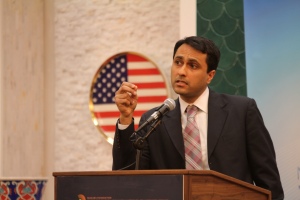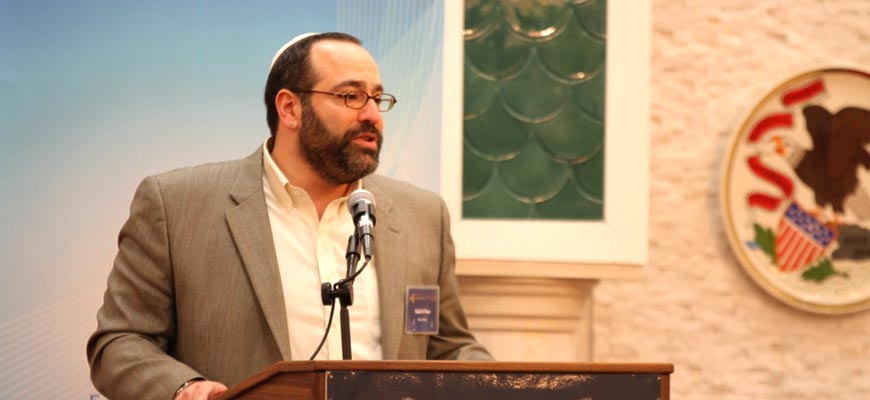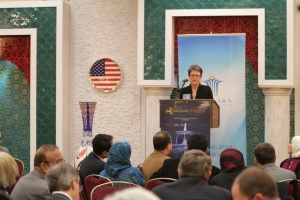Nearly 300 guests gathered for Niagara Foundation’s annual Abrahamic Traditions Dinner to witness a phenomenon that several faith leaders are calling a remarkable shift in religious history.
“We are in a process of being both inheritors and innovators in our different religious traditions,” said Rabbi Or N. Rose, the director for global Judaism at Hebrew College. Rose was the first of three speakers to address the audience at the new Turkish Cultural Center in Mt. Prospect.
Niagara invited clergy and community leaders from the three Abrahamic faiths, Judaism, Islam and Christianity. The seating arrangement deliberately placed members of different faiths at the same table, and the result was a grand ballroom booming with chatter. Priests parleyed with imams, and Jews swapped stories with Catholics.
Bishop Sally Dyck from the United Methodist Church and Eboo Patel, the president and founder of Interfaith Youth Corps, spoke after Rabbi Rose. The three speeches focused on the night’s theme, pluralism.
“In many circles, this kind of gathering is considered countercultural, but we’re striving to write a new chapter in the history of religions,” Rose said. “And we’re living in the U.S., which is the most religiously diverse and the most religious country in the western world.”
And that diversity could help people go deeper on their journey, Rose said.
“As much as I know and love my Judaism, I need the input, the companionship and the inspiration of people from other religious and secular traditions.”
Rose said successful interfaith collaboration also requires wrestling with one’s own faith, particularly the “challenging texts” that may need an adjustment or clarification of context.
Bishop Sally Dyck summarized the uneasy practice in one made-up word: “with-ness.”
Dyck explained that the awkward pronunciation of “with-ness,” particularly for a non-native speaker, is the perfect metaphor for interfaith cooperation. It’s easier to say and practice the word “witness,” but it runs the risk of converting and judging your neighbor. Dyck said “with-ness,” on the other hand, is an exercise in harmony that requires constant practice.
The final speaker, Eboo Patel, experienced “with-ness” at an early age. He opened his speech with a colorful story from his childhood, in honor of his mother, who was also at the dinner.
At the age of 6, Patel was invited to a classmate’s birthday cookout. His mother sent him to the party with two halal hot dogs in a plastic bag. An embarrassed Patel arrived at the party and sulked into the kitchen to give his “special” meat to the hostess. His eyes fell on another kid holding two hot dogs — kosher hot dogs. The two kids became instant friends.
“We had no idea what was going on in the Middle East,” Patel joked. “We just knew we had moms who made us bring our own hotdogs.”
Patel has become an international leader in interfaith collaboration, and he’s one of President Obama’s faith advisers. His most recent book, “Sacred Ground: Pluralism, Prejudice and the Promise of America,” presents a hopeful argument — that pluralism is the core of America’s identity.

Interfaith Youth Corps Founder Eboo Patel shares stories from his childhood and recent book. “Our country is molten, and ready to be reshaped,” Patel said.
But that “transformation” is still a work in progress, Patel said. He wrote “Sacred Ground” after feeling discouraged by anti-Islamic rhetoric that surfaced during debates about the construction of an Islamic center near Ground Zero in 2010.
His sadness, and even anger, subsided when he realized that many non-Muslims were condemning the Islamophobic sentiments in the media. Mayor Michael Bloomberg, a Jew, was one of them.
Patel thanked the mayor, and “Bloomberg said, ‘I couldn’t call myself an American if I didn’t stand up for a religious community seeking a place to both pray and contribute.’”
It was a stance that the mayor didn’t take lightly. When Bloomberg was a child, his family couldn’t purchase a home in a Boston suburb because they were Jewish. Their Christian lawyer had to buy a house and sell it to them under the table.
“That kind of prejudice has happened to a lot of groups in American history,” Patel said. “And it takes one person to stand up and say, ‘that will never happen in America again.’”
Cassidy Herrington is Niagara Foundation’s director of communications.


